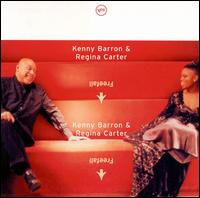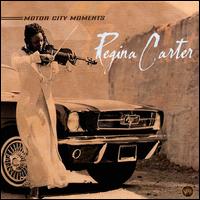
A FIRESIDE
CHAT WITH REGINA CARTER
Having
been forced to play the violin in my youth, I am well versed with classical
violinists like Jascha Heifetz and Itzhak Perlman. My image of "jazz"
violinists was something between a hillbilly with a fiddle in hand and
a pagan half man, half horse. I have come a long way since. This is large
in part to improvisers like Regina Carter who take the instrument beyond
the Tchaikovsky Violin Concerto. Ms. Carter took some time off her busy
schedule to sit down with the Roadshow. As always, I bring it to you unedited
and in her own words.
FRED
JUNG: Let's start from the beginning.
REGINA
CARTER: Well, I had been playing classical music up until I was sixteen
and still playing it actually. I was given some recordings of two jazz
violinists, Noel Pointer and Jean-Luc Ponty and then a friend of mine
took me to hear Stephane Grappelli, who's another jazz violinist and that
was my first introduction to jazz and my first live jazz concert. Just
seeing how much fun they were having on stage, the musicians, and hearing
the freedom in the music and the fact that someone could improve and add
and have their own say in the music at the same time was really what interested
me in jazz and so from there, I just had to kind of find my way in the
music and studying it because there weren't any jazz violin teachers around
to teach me and I had to find my own way.
FJ:
The transition must have been a challenge.
REGINA
CARTER: Yeah, definitely, Fred. Just in classical music, you have the
music all written down. There's a certain way you phrase certain pieces,
depending on the composer and the period that it had come from. And with
jazz, of course there is different styles as well, but improvising is
improvising. You just have to know the rules that go along with that and
then try and forget the rules. Basically, you are composing on top of
the chord changes that were already there underneath the original melody,
but you're doing it on the spot and the whole trick or the game of it
is that each time you go through the piece, which each time from top to
bottom is a chorus, you're trying to come up with another tune per say,
improvising and not really repeating yourself too much, so it's like telling
a story off the top of your head for each chorus. So that's the major
difference and just stylistically, the way you play the music is very
different as well. There is a lot of listening that has to be done and
imitating and just changing of the way you approach the music.
FJ:
Your classical music teachers must have disapproved of your affinity for
improvisation.
REGINA
CARTER: Yes, my high school teacher, as a matter of fact, had set up a
master class for me with Yehudi Menuhin at the time with my quartet and
we played and I played a solo piece and he said to Yehudi, "She wants
to play jazz," but he said it in a very negative tone and Yehudi
said, "Leave her alone. It's great music," because he, even
though he is a great classical violinist, had been hanging out and trying
to play some jazz. But at least he was appreciative of the music and open
to it. In college, it was a big thing. I went to the New England Conservatory
because there was such a division between the classical and the jazz department
at the time and one feeling like the other was not real music. So I didn't
stay there long, just because I couldn't deal with that. For me, music
is music, Fred. I felt like I wanted to be exposed to whatever was out
there. I went back to Detroit and finished up at Oakland University in
Rochester, Michigan, where there was no division really in the music and
Detroit has such a rich jazz community happening and just music community
period, no matter what it was that I felt like I would grow up better
as a musician there. There was so much going on at the time. The scene
was still pretty rich. There were a lot of clubs, loft spaces happening,
a lot of bands still there and a lot of Detroiters like Tommy Flanagan,
Ron Carter, Betty Carter were still coming through and playing at clubs.
Everybody was coming through and playing. So you could always hear some
great music and places to have jam sessions and festivals going on at
that time. It slowly started to fade because a lot of people left the
city. The car industry really left. Detroit sort of became like a ghost
town and there weren't that many places left for musicians to play. There
is still a handful of places and luckily, fortunately, the city is starting
to come back. I don't know that it will ever be the same as it was as
far as the jazz scene and the music scene, the intensity. But at one point,
there was just so much there and I mean, there are a lot of people that
are great musicians that still live there like Marcus Belgrave and if
you want lessons from them or have a chance to play, you can go to their
homes. They will have, sometimes, concerts in their homes or they will
have workshops going on in their homes.
FJ:
You left Straight Ahead and moved to New York.
REGINA
CARTER: I knew that I wanted to live in New York and I felt like I had
to be here if I really wanted to pursue a career as a musician. So I told
them from the beginning that I would be moving to New York. In the beginning,
they all thought that they were going to come as well, but that never
happened. It was, for a while, me living here in New York and them still
in Detroit that I could meet up with them on gigs, but then I started
getting calls here from musicians that I had always wanted to work with.
People like Oliver Lake, Muhal Richard Abrams and then the String Trio
of New York. And I started to find that sometimes, if I got called here
for a gig before Straight Ahead had a gig, then of course, I had to take
the gig that came in first here and so I couldn't any longer have a loyalty
to that band.
FJ:
Considering the String Trio had already established itself prior to your
coming on board, how conscious were you of not disrupting its chemistry?
REGINA
CARTER: That didn't intimidate me. The music intimidated me, only because
it was so different from anything I was used to. The improvisation was
very different. It was more altered technique, using your instrument in
other ways than it was meant to be used for. Just the approach to the
music was very new to me. The openness of it was very new to me, so that's
what intimidated me. But once, we really started having rehearsals before
the first gig and I kind of started getting a grasp of what I thought
was going on, I became more comfortable. And of course, after doing more
and more gigs with them, then I really felt comfortable in that seat.
But I'm not usually intimidated of groups that have already been in existence.
I prefer that really. It is just new situations and new ideas that are
what present the intimidation factor.
FJ:
How do you grade your efforts for the Atlantic label, Regina and Something
from Grace?
REGINA
CARTER: I think, at the time, I was just kind of really searching since
they were my first two records of what did I want to put out there. What
was my voice? What was I looking to convey? And so the first record, I
did probably a bit more writing on that record and just try and kind of
find my way. It was interesting because it was like being in a candy store
and saying that you can have anything and not really being able to make
a decision. So I kind of just did whatever. I did it all. I think on the
second record, it was probably more of a mixture between the acoustic
and the electric. It was more of a conscious effort to include some more
jazz, standard jazz, I call it straight ahead jazz, if you will, on the
record, so that by the third record, I found myself even moving further
and further away from that, from the electric sound.
FJ:
Wynton and his minions seem to have it on the brain that jazz needs to
"swing." The violin is not recognized for its swinging nuances.
How much of a challenge is it to find new approaches to an instrument
so strongly identified with classical music?
REGINA
CARTER: Right, well, there have been great people before me that have
proved that the violin does swing. It is much harder. We have to work
a little bit harder than anyone else does. We will have to work on the
instrument, especially because if you are coming from the classical world
like I am, than I have to work a lot harder at it. But it can swing. And
I have found, oddly enough, the instrument is still not widely accepted
in the jazz idiom. But I think that that's going to soon change because
there is so many people that are playing jazz on string instruments now
and it is being taught and accepted in universities across the country
now. So people are going to have to start paying attention to the instrument.
I've been accepted by a lot of people including Wynton, so that definitely
helps me to be able to move around in certain circles that wouldn't necessarily
accept the instrument. But, yeah, I have to really say, "OK, don't
look at this instrument as a violin. Just look at it as a piece of wood,"
and try and make it swing. Try and make it sound like a vocalist. Try
and do this kind of vibrato here and just use it as a jazz instrument
and forget that fact that I came from the classical world with that. So
that is the biggest thing is trying to leave that behind.
FJ:
Do you find that there are moments where that classical background hinders
your improvisational creativity?
REGINA
CARTER: It doesn't get in the way. It could, but I've kind of learned
how to take what I need from that and leave the rest. Sometimes things
will come through. I will hear them coming through and I have to make
a conscious effort not to do certain things like the vibrato, I have to
really watch that or sometimes using too much bow because then a line
that I'm trying to play does sound corny and it doesn't swing. And just
continuing to really study jazz and take lessons with that so that I can
have my feet really planted strongly into the ground in that world and
can bring that to my playing. So it is important for me to keep that side
up.
FJ:
You signed with Verve in the midst of the merger between Polygram and
Universal. Was there any cause for concern?
REGINA
CARTER: I think from time to time, I would get a little bit concerned,
but I was always reassured that I was OK. But I wasn't that overly concerned
because I felt like Verve was the kind of label that if they're going
to do something for you, then you know it and they do it. If they are
not, you know it. They don't tend to beat around the bush or sugarcoat.
So I knew that once my manager said, "No, you're OK. It's going to
be OK," I always know that they are pretty much on the up and up.
For the artists that they were keeping, they've always had a reputation
of really getting behind their artists and doing something. They're a
proactive label instead of a reactive label. So I knew that they wouldn't
keep me on there, and especially, they just signed me and put the record
out and not do anything. So I was pretty much relaxed about it.
FJ:
Let's touch on your homage to your hometown, Motor City Moments. Interesting
song selections.
REGINA
CARTER: Well, I wanted to give people, so many people, industry people
and critics have said of my playing that was on my recordings, that they
were all over the map and I wanted to show them why, that musicians coming
out of Detroit, especially my generation or younger. We grew up with so
many, so much music going on. There was Motown. There was Parliament and
the Funkadelic. We have a huge Latin community, so there was that music.
We have a huge Arabic community, so there was that music. All the stuff
was just like floating through the city, techno, and that's part of our
lives and our world and so that is going to come through in our playing
unless someone is definitely into one thing and one thing only. In this
day and age, I don't see how you can be a young person, when you are being
inundated with all these different sounds, so I am trying to give people
who have never been to Detroit or don't really know much about the city,
an idea of musically what was going on there and the history of the city.
And of course, I couldn't get all of it all on one record. But I think
in showcasing some of the Motown stuff and even taking a jazz tune by
a well known jazz musician from Detroit and arranging as a danzon and
showing that these are different musical influences that are happening
in Detroit, but just kind of give a quick overview. It doesn't even include
all of the influences that I grew up with.
FJ:
Isn't that a dig when critics and the media generalizes your playing as
all over the map?
REGINA
CARTER: Well, it depends on how they say it, Fred. The way it's been said,
I don't take it as a dig, but it has been said in a very derogatory way,
like they can't handle the fact they want it just to be this one kind
of record. I'm not that kind of a musician. I don't even listen like that.
In my CD player, you might find five different, you're going to find five
different things that just totally don't even add up to most people. I
just love everything and that's how I like to listen and that's how I
like to play and I do my program my shows the same way. I'll do like two
straight ahead kind of tunes and I'll do a West African and an Afro-Cuban
and just a lot of fun stuff in there, something for everybody, but something
that we all really enjoy doing and it's honest. I'm not trying to please
everybody. I am just basically pleasing myself and in that, hopefully,
pleasing the audience.
FJ:
James Carter and Regina Carter, there is a relation.
REGINA
CARTER: Second cousins, yeah. Well, James is really a hard worker. He
always has been a hard worker, really serious about the music, extremely
serious person period. And just watching him from when he was very young
to now, it is amazing. He has always been an inspiration to me because
he's very dedicated and very disciplined. I wish somebody could sell me
some discipline (laughing). I'm probably the most undisciplined person
I know (laughing). So he is incredible. He's just very incredible. There
are not too many people that can play all of the reed instruments very
well and he's one of them that can. He definitely holds his own, but he's
put in a lot, a lot, a lot of hours and a lot of time. He deserves everything
he's getting.
FJ:
You don't have a violin collection like he has a saxophone collection,
do you?
REGINA
CARTER: No, my apartment is not even big enough (laughing). No, I have
two violins here. But saxophones don't cost as much as violins to either.
I'm trying to buy a violin now and I thought a hundred thousand was going
to be OK, but the ones I've been looking at, the ones I need start at
two hundred thousand and up. I don't have it like that, so I don't think
I will be collecting anything (laughing).
FJ:
At those prices, I am almost sorry that I didn't keep up with the violin.
REGINA
CARTER: (Laughing) Yeah, you know. How long did you play for?
FJ:
Seven ever so grueling years.
REGINA
CARTER: (Laughing) I know. I know the feeling.
FJ:
What is on the horizon?
REGINA
CARTER: I just finished recording a duo record with Kenny Barron. So that'll
come out in the spring. And touring, the year is going to get crazy starting
tomorrow. Just touring and then I'll have to start thinking about what
I want to do with my next project.
FJ:
A duo record with Kenny Barron. Nice.
REGINA
CARTER: Yeah, it was a lot of fun, a lot of fun. It was something that
we have been talking about for a very long time. So I am really happy
that it came to pass. I am really honored to have been able to do that
with him because he is such a great musician and he's a mentor for me.
Fred Jung is Editor-In-Chief and is taking a bath in the market. Comments?
Email him.


